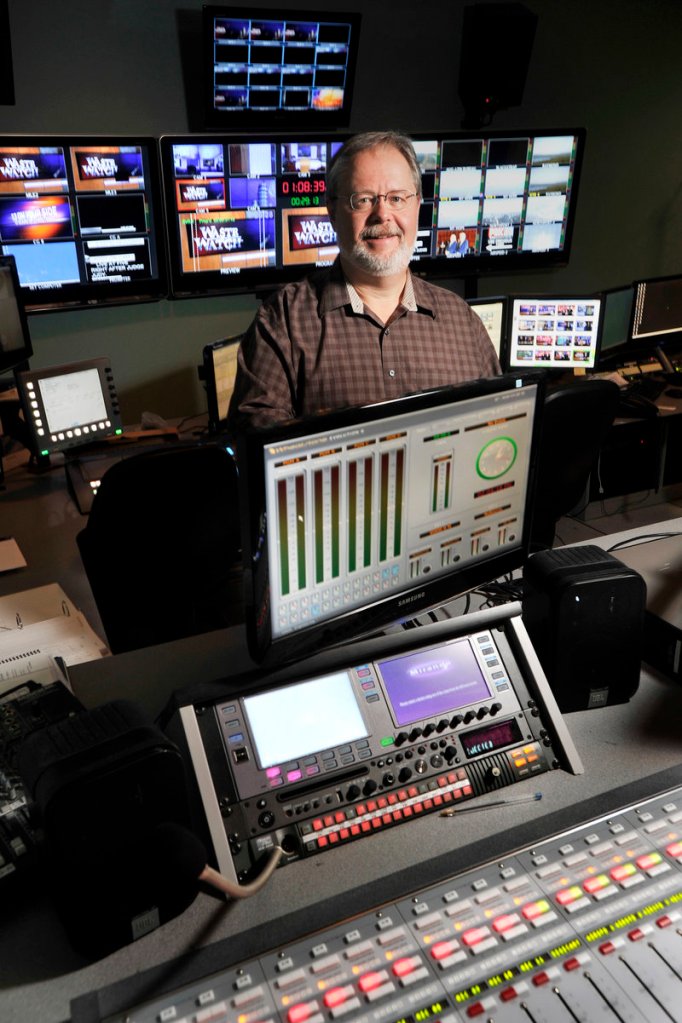Cries of “The Furniture Superstore! The Furniture Superstore!” and other ear-splitting commercial pitches emanating from TV sets across Maine should be quieter right about now.
New Federal Communications Commission rules limiting the volume of TV commercials took effect Thursday, after years of people complaining that ads on TV were obnoxiously loud — much louder than the programs they interrupt.
Adopted in December 2011, the Commercial Advertisement Loudness Mitigation (CALM) Act requires that TV stations, cable and satellite operators, and other pay TV providers ensure that commercials “have the same average volume as the programs they accompany.” Failure to comply could result in fines.
Many viewers are loudly cheering the idea of quieter commercials, and local TV stations and other TV providers say the rules make sense and should be fairly easy to live by.
But at least one Maine advertiser says the new rule could hurt business.
Doug Abrams of The Furniture Superstore in South Portland and Lisbon says the whole idea of a business buying a TV ad is to get noticed. In The Furniture Superstore’s commercials, Abrams shouts his store’s name — over and over and over again — to capture viewers’ attention.
And a quieter ad, he fears, may get less attention.
“I really can’t say if it will affect us or not, or whether we’ll change our ads, but the two ways to get people to notice your ads is either by the frequency or by doing something unusual,” said Abrams, a co-owner of the family-owned stores.
“If I was a TV watcher, I’d say this is a great thing,” he said. “But people should realize this could affect businesses. Businesses might have to redirect some of their advertising.”
But some viewers are saying the opposite might occur — that lowering the volume on commercials might make them pay more attention, not less.
“Whenever I turn on the TV and get a commercial, I feel accosted, and my reaction is to protect myself and retreat, so I don’t watch it,” said Arthur Fink, 65, a consultant to nonprofit groups and a photographer who lives on Peaks Island. “But if I hear a commercial at a more reasonable volume, I’m more likely to listen.”
Jamie Brookes, 56, of Yarmouth, watches very little commercial TV and thinks it’s “presumptuous” of TV providers and advertisers to “barge into” people’s homes with ads that are much louder than programs.
Portland’s TV stations say that in the past, it was harder to control the volume of commercials, because ads are produced by outside sources before being delivered to the station or cable company. But complying with a commercial volume standard today is simpler, because the right tools are available.
“We have equipment in place now that monitors the audio and looks at all the data, and it has boundaries for what the volume should be,” said Craig Clark, chief engineer at Portland’s CBS affiliate station, WGME (Channel 13).
When broadcasters were required by the government to switch from analog to digital signals a few years ago, the difference in program and commercial volumes became even greater.
“The compression technology used with digital raises all aspects of the audio, and basically it enhanced the sound,” said Steve Carter, president and general manager of Portland’s NBC affiliate, WCSH (Channel 6). “With technology today, we have the ability to control (volume) for commercials.”
All but one of Portland’s six commercial TV stations said they were ready to begin complying with the CALM Act right away, and have the equipment in place and tested. Some, including WGME and Portland’s ABC affiliate, WMTW (Channel 8), have been using the equipment for about a year.
But one Portland station, Fox affiliate WPFO (Channel 23), has applied for a three-month extension, which it is allowed to do under FCC regulations. Dave Cox, head engineer, said the extension is necessary because WPFO is building a new master control room where the audio equipment will be housed.
Time Warner Cable, the area’s largest cable provider with more than 360,000 customers in Maine, is also ready to comply with the new standards, said Andrew Russell, a spokesman for Time Warner in Maine.
So what happens if commercials are still a lot louder than regular programming? Carter says you can begin by calling the station, and it will try to address the problem. But the FCC also has an online platform for complaints: esupport.fcc.gov/complaints.htm.
The FCC said it will rely on viewer complaints to determine if commercials are too loud. And while program providers could face fines for not complying, penalties are not spelled out, according to the FCC.
Another of Maine’s TV advertisers, Wally Camp Jr. of Rowe Ford Sales in Westbrook and Auburn Motor Sales, doesn’t think the new volume levels will affect his business negatively, and he’s ready to have his commercials run at whatever volume the TV stations tell him. Like Abrams, Camp appears in his own ads, and is often seen calling out, “Marking ’em down and moving ’em out.”
“I really don’t think it’s going to impact us in any way,” said Camp. “So whatever we’re supposed to do, we’ll do.”
TV ads have received a lot of complaints over the years, but some folks feel they are just part of a larger overall problem — a society that’s gotten increasingly louder as technology has brought recorded audio into every part of our lives, from the boardroom to the bedroom to the bathroom.
“I notice (louder ads) in movie theaters and on radio too,” said David Treadwell, 70, a freelance writer in Brunswick. “So I welcome anything which can smooth out the barrage of commercial appeals.”
Message received, loud and clear.
Staff Writer Ray Routhier can be contacted at 791-6454 or at:
rrouthier@pressherald.com
Send questions/comments to the editors.




